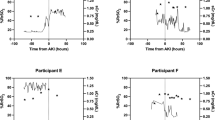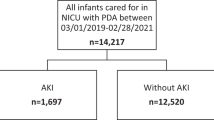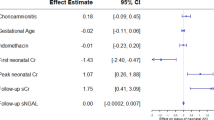Abstract
Introduction
We present a case series of neonates with anuric ESRD undergoing renal replacement therapy (RRT) and discuss the associated ethical implications of RRT in this population.
Methods
We reviewed patients who initiated RRT within 1 week of life due to anuric ESRD from 2009–2019 at a single tertiary center. Primary outcomes were receipt of renal transplant (RT), one-year survival, and overall survival.
Results
Five patients met the inclusion criteria. Two patients received an RT. One-year survival was 80%, while overall survival was 60% with a median follow-up of 18 months. In the 2 still-living patients who have not undergone RT, they are ineligible, one due to recent malignancy and the other from acquired cardiovascular comorbidities.
Conclusion
Patients with anuric ESRD requiring RRT undergo multiple treatment challenges with low RT and survival rates. These findings should be shared with families considering intervention for cases of severe renal disease diagnosed prenatally.
This is a preview of subscription content, access via your institution
Access options
Subscribe to this journal
Receive 12 print issues and online access
$259.00 per year
only $21.58 per issue
Buy this article
- Purchase on Springer Link
- Instant access to full article PDF
Prices may be subject to local taxes which are calculated during checkout
Similar content being viewed by others
Data availability
Data is not publicly available due to patient privacy laws but are available from the corresponding author on reasonable request.
References
Thomas AN, McCullough LB, Chervenak FA, Placencia FX. Evidence-based, ethically justified counseling for fetal bilateral renal agenesis. J Perinat Med. 2017;45:585–94.
Sugarman J, Anderson J, Baschat AA, Herrera Beutler J, Bienstock JL, Bunchman TE, et al. Ethical considerations concerning amnioinfusions for treating fetal bilateral renal agenesis. Obstet Gynecol. 2018;131:130–4.
Jelin AC, Sagaser KG, Forster KR, Ibekwe T, Norton ME, Jelin EB. Etiology and management of early pregnancy renal anhydramnios: is there a place for serial amnioinfusions? Prenat Diagn. 2020;40:528–37.
Sheldon CR, Kim ED, Chandra P, Concepcion W, Gallo A, Su S, et al. Two infants with bilateral renal agenesis who were bridged by chronic peritoneal dialysis to kidney transplantation. Pediatr Transpl. 2019;23:e13532.
Bienstock JL, Birsner ML, Coleman F, Hueppchen NA. Successful in utero intervention for bilateral renal agenesis. Obstet Gynecol. 2014;124(2 Pt 2 Suppl 1):413–5.
Riddle S, Habli M, Tabbah S, Lim FY, Minges M, Kingma P, et al. Contemporary outcomes of patients with isolated bilateral renal agenesis with and without Fetal Intervention. Fetal Diagn Ther. 2020;47:675–81.
van Stralen KJ, Borzych-Dużalka D, Hataya H, Kennedy SE, Jager KJ, Verrina E, et al. Survival and clinical outcomes of children starting renal replacement therapy in the neonatal period. Kidney Int. 2014;86:168–74.
Carey WA, Talley LI, Sehring SA, Jaskula JM, Mathias RS. Outcomes of dialysis initiated during the neonatal period for treatment of end-stage renal disease: a North American Pediatric Renal Trials and Collaborative Studies special analysis. Pediatrics. 2007;119:e468–73.
Taylor DR, Lightbody CJ. Futility and appropriateness: challenging words, important concepts. Postgrad Med J. 2018;94:238–43.
Bosslet GT, Pope TM, Rubenfeld GD, Lo B, Truog RD, Rushton CH, et al. An official ATS/AACN/ACCP/ESICM/SCCM Policy Statement: responding to requests for potentially inappropriate treatments in intensive care units. Am J Respir Crit Care Med. 2015;191:1318–30.
Brown GT. Medical futility in concept, culture, and practice. J Clin Ethics. 2018;29:114–23.
Tomlinson T, Brody H. Ethics and communication in do-not-resuscitate orders. N. Engl J Med. 1988;318:43–6.
Schneiderman LJ, Jecker NS, Jonsen AR. Medical futility: its meaning and ethical implications. Ann Intern Med. 1990;112:949–54.
Grant SB, Modi PK, Singer EA. Futility and the care of surgical patients: ethical dilemmas. World J Surg. 2014;38:1631–7.
Burns JP, Truog RD. Futility: a concept in evolution. Chest. 2007;132:1987–93.
Zurowska AM, Fischbach M, Watson AR, Edefonti A, Stefanidis CJ, Group EPDW. Clinical practice recommendations for the care of infants with stage 5 chronic kidney disease (CKD5). Pediatr Nephrol. 2013;28:1739–48.
Bunchman TE. The ethics of infant dialysis. Perit Dial Int. 1996;16(Suppl 1):S505–8.
Medway M, Tong A, Craig JC, Kim S, Mackie F, McTaggart S, et al. Parental perspectives on the financial impact of caring for a child with CKD. Am J Kidney Dis. 2015;65:384–93.
Tong A, Lowe A, Sainsbury P, Craig JC. Parental perspectives on caring for a child with chronic kidney disease: an in-depth interview study. Child Care Health Dev. 2010;36:549–57.
Lantos JD, Warady BA. The evolving ethics of infant dialysis. Pediatr Nephrol. 2013;28:1943–7.
Klaassen I, Neuhaus TJ, Mueller-Wiefel DE, Kemper MJ. Antenatal oligohydramnios of renal origin: long-term outcome. Nephrol Dial Transpl. 2007;22:432–9.
Warring SK, Novoa V, Shazly S, Trinidad MC, Sas DJ, Schiltz B, et al. Serial amnioinfusion as regenerative therapy for pulmonary hypoplasia in fetuses with intrauterine renal failure or severe renal anomalies: systematic review and future perspectives. Mayo Clin Proc Innov Qual Outcomes. 2020;4:391–409.
Author information
Authors and Affiliations
Contributions
DSH: Substantial contributions to the design of the work, the acquisition, analysis, and interpretation of data, drafting of the work and critical revision. MEB: Substantial contributions to the conception and design of the work, the analysis and interpretation of data, drafting the work and critical revision. JJG: Substantial contributions to the conception and design of the work, drafting the work and critical revision. VMV: Substantial contributions to the conception and design of the work, the analysis and interpretation of data, drafting the work and critical revision. All authors approve of the final version to be published and agree to be accountable for all aspects of the work.
Corresponding author
Ethics declarations
Statement of Ethics
Our study complied with the guidelines for human studies and was conducted ethically in accordance with the World Medical Association Declaration of Helsinki. The study protocol was approved by our institutional review board (IRB) committee on human research, approval 19–1369. This study was granted exemption from requiring written informed consent by the University of Colorado, Anschutz IRB committee.
Competing interests
The authors declare no competing interests.
Additional information
Publisher’s note Springer Nature remains neutral with regard to jurisdictional claims in published maps and institutional affiliations.
Rights and permissions
About this article
Cite this article
Han, D.S., Bock, M.E., Glover, J.J. et al. Outcomes of dialysis in neonates with anuric end-stage renal disease at birth: ethical considerations. J Perinatol 42, 920–924 (2022). https://doi.org/10.1038/s41372-022-01328-2
Received:
Revised:
Accepted:
Published:
Issue Date:
DOI: https://doi.org/10.1038/s41372-022-01328-2



